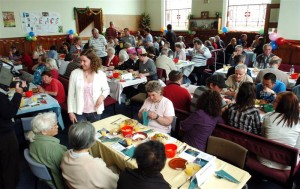Whether it’s called a fundraiser, a BBQ, or, in Australia, a sausage sizzle, what is the best way to balance the wishes of well-meaning volunteers with the realities of microbial food safety?
 With five daughters, I’ve been to hundreds of these things over the years and seen some terrible food safety practices, even at swanky corporate events. Whenever I can, I volunteer to help with the cooking and pre-planning. But I’m not going to have much impact, one sausage sizzle at a time. And if I mention anything, other parents get defensive and think I’m an asshole (they may be right).
With five daughters, I’ve been to hundreds of these things over the years and seen some terrible food safety practices, even at swanky corporate events. Whenever I can, I volunteer to help with the cooking and pre-planning. But I’m not going to have much impact, one sausage sizzle at a time. And if I mention anything, other parents get defensive and think I’m an asshole (they may be right).
Michigan’s Lansing State Journal has some decent recommendations, writing that curtailing concessions likely means reducing revenue that boosters raise to help defray costs of equipment, uniforms and, in some cases, pay-to-participate fees for needy students. Yet, how could anyone support looking the other way if food isn’t being handled and prepared safely?
Ingham County officials acknowledged in a recent LSJ report that they had been lenient in enforcing safe food handling requirements at school athletic concessions.
Yet while improving enforcement, they observed such unsafe practices as not tracking the freshness date on raw ground beef. They found well-meaning boosters were cooking food such as chili at home and bringing it to athletic venues for sale. They found food being prepared in locations with no hand-washing equipment, even though portable sinks exist for just such circumstances.
 Cracking down on volunteers who are trying to support student activities may seem harsh, but basic food safety measures such as hand-washing rules and keeping both raw and cooked foods at safe temperatures simply must be followed. For the sake of public health, these things can’t be optional.
Cracking down on volunteers who are trying to support student activities may seem harsh, but basic food safety measures such as hand-washing rules and keeping both raw and cooked foods at safe temperatures simply must be followed. For the sake of public health, these things can’t be optional.
Booster groups are volunteer efforts, but don’t face more demanding responsibilities. County officials began requiring licensing on May 1. Those who aren’t licensed can use pre-packaged items. That’s reasonable.
Booster concessions are an effective source of revenue. In some districts, $20,000 or more worth of food and drinks are sold each year.
In Australia, Food Safety Standards include requirements for the handling, storage, transport and display of food. The Standards are in the process of being adopted by each State and Territory and, when adopted, will specify requirements that are consistent across Australia for the first time. A copy of the Food Safety Standards is available from the FSANZ website at www.foodstandards.gov.au and may also be available from local council or health authority.
This definition of a food business includes all food activities involved in fundraising, including preparation of the food before it is sold. The definition of sale covers fundraising activities. Food has been sold even if you just ask for a donation.
Good intentions and safety can co-exist.




(7).jpg) was spread, aid Robert South, department epidemiologist.
was spread, aid Robert South, department epidemiologist. The event was a benefit for New Pathways of Brainerd, a group that helps homeless families with children find safe transitional shelter.
The event was a benefit for New Pathways of Brainerd, a group that helps homeless families with children find safe transitional shelter. .jpg) A total of 11 people have been hospitalized, and DHEC officials believe there are about 125 people who sought physician care for gastro-intestinal illness symptoms in the area, Beasley said.
A total of 11 people have been hospitalized, and DHEC officials believe there are about 125 people who sought physician care for gastro-intestinal illness symptoms in the area, Beasley said.